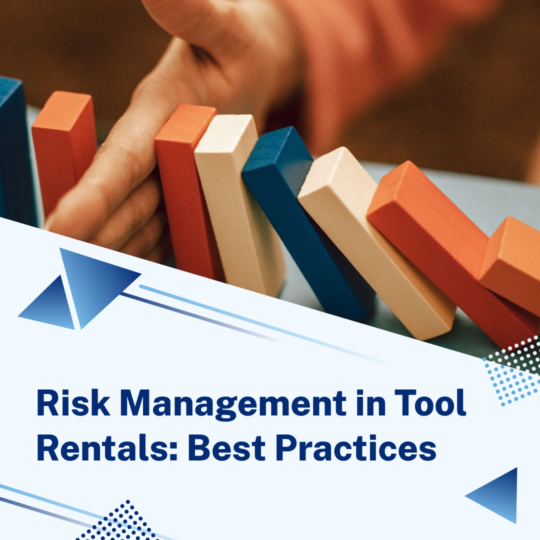Tool rental businesses provide an essential service for both DIY enthusiasts and professionals. However, they also face a range of risks that can threaten their operations, reputation, and bottom line. Effective risk management is crucial for ensuring the success and longevity of a tool rental business. Let’s explore best practices for managing risks in the tool rental industry.
Thorough Screening of Customers
The first step in risk management is to ensure that customers renting your tools are responsible and capable of using them safely. Implement a strict customer screening process that may include:
- Requiring identification and proof of address.
- Checking for a valid driver’s license or other necessary certifications.
- Conducting background checks if necessary.
This screening process helps to reduce the likelihood of popular rental equipment being misused or stolen.
Comprehensive Rental Agreements
A well-drafted rental agreement is an essential tool for managing risk. It should clearly outline the terms and conditions of the rental, including:
- Rental period and rates.
- Responsibility for maintenance and repairs.
- Liability for damage or loss of the tool.
- Safety guidelines and proper usage instructions.
A well-crafted agreement protects both your business and your customers by establishing clear expectations.
Insurance Coverage
Consider investing in insurance coverage, specifically tailored to the tool rental industry. This can include general liability insurance, property insurance, and equipment rental coverage. Insurance provides an extra layer of protection and peace of mind, especially in cases of accidental damage, theft, or injuries related to tool usage.
Regular Maintenance and Inspection
Maintaining tools in optimal working condition is crucial to reduce the risk of accidents and equipment failures. Implement a regular maintenance schedule and perform thorough inspections before and after each rental. This not only reduces the risk of accidents but also extends the lifespan of your tools.
Safety Training and Customer Education
Providing safety training and education to your customers is a proactive way to manage risk. Offer guidance on how to use the tools safely and provide printed materials with usage instructions. Encourage customers to ask questions and address any concerns they may have about using the equipment.
Security Measures
Implement security measures to protect your tools and property. This may include:
- Installing security cameras.
- Fencing and gating the rental facility.
- Proper lighting for night-time security.
- Using sturdy locks and alarm systems.
These measures can deter theft and vandalism.
Document Everything
Detailed record-keeping is an essential risk management practice. Document each rental transaction, including customer information, equipment condition, and any damage incurred during the rental period. These records are invaluable when disputes or claims arise.
Emergency Response Plan
Prepare for unexpected situations with an emergency response plan. This plan should outline what actions to take in case of accidents, theft, or damage. It is essential to have a clear process for reporting incidents and ensuring the safety and satisfaction of your customers.
Compliance with Regulations
Familiarize yourself with local, state, and federal regulations that pertain to tool rental businesses. Ensure rental equipment compliance with zoning, environmental, and safety regulations. Non-compliance can lead to legal issues and reputational damage.
Customer Feedback and Continuous Improvement
Customer feedback is a valuable resource for risk management. Encourage customers to provide input on their rental experience. Use this feedback to continuously improve your processes and mitigate potential risks.
Managing risk in tool rentals is crucial for the long-term success of your business. By implementing the best practices outlined in this article, you can protect your assets, enhance customer satisfaction, and maintain a positive reputation. Remember that risk management is an ongoing process that requires vigilance and adaptability to changing circumstances in the tool rental industry. Next, read our guide to equipment rental software

